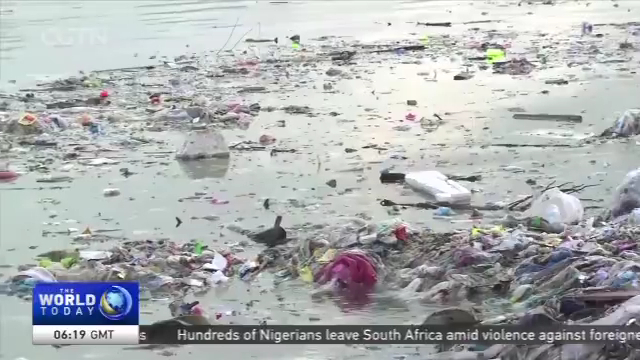
15:18, 12-Sep-2019
Alternative Plastics: The best solution to plastic problems?
Updated
15:28, 12-Sep-2019

A British company has created a different kind of plastic that's plant-based and breaks down. While this brings some hope to reducing pollution caused by plastic waste, it does not solve the problem entirely. CGTN's Kitty Logan reports from Bristol.
This is what we throw away – every day. Containers, bottles, bags, packaging. All made of plastic. The city of Bristol recycles 75 tonnes of it weekly. But any plastics contaminated with food can't be processed here. So – what's the alternative? This may look like a plastic cup, but it's plant-based and breaks down in a composting process. This Bristol café aims to avoid all conventional single-use plastics. It uses this alternative product – created by a company called Vegware - for its takeaway containers.
ANTONY LINDLEY MARY-JANE'S CAFE "We've had just over one tonne of waste which has gone and been composted, through the Vegware system, and that could have gone to landfill if we hadn't done this right from the outset.
The concept aims to eliminate the issue of food in plastic waste – so it can be recycled.
"Our hot cups are made of cardboard and PLA lining the inside of the cup. PLA is essentially corn starch."
The company also runs a collection service to ensure their products are recycled properly.
GEORGIA BUDDEN VEGWARE RECYCLING ADVISOR "The beauty of making plant-based compostable disposables is that they can be captured in one bin, and sent for composting and be processed in 12 weeks into compost."
During this specialised process, high temperatures help convert cups to soil. But it can only be done at a few designated sites in the UK. That means customers and cafés have to ensure their used cups end up in the right bin. If they don't, there's a hitch. Alternative plastic products – or bioplastics - CAN'T be put through your standard city recycling. So - are bioplastics really the solution to our global plastic problem? Nathalie Fee from the environmental campaign group City to Sea says - ultimately, they're not.
NATHALIE FEE CITY TO SEA FOUNDER "The problem with alternative plastics and bioplastics is if they do end up in the marine environment, they could have exactly the same impact as conventional plastics. They're not going to biodegrade."
And that means potentially adding to the existing problem. Plastic in the world's oceans is already damaging the environment and marine life. Public awareness of the plastic problem is increasing. At this café, you can only take your drink away in your own cup.
KITTY LOGAN BRISTOL, UK "Environmentalists say that while alternative plastics are a positive development, the best solution for our planet is to buy a reusable cup and refill it every time you have a drink."
Campaigners say alternative plastics do work, especially at large events with coordinated waste collection. But thrown in the wrong bin, they end up here – tied up with conventional plastic waste. Technology may one day create new solutions. But for now, the message is to avoid ANY single use plastics whenever possible. Kitty Logan, CGTN, Bristol.
SITEMAP
Copyright © 2018 CGTN. Beijing ICP prepared NO.16065310-3
Copyright © 2018 CGTN. Beijing ICP prepared NO.16065310-3